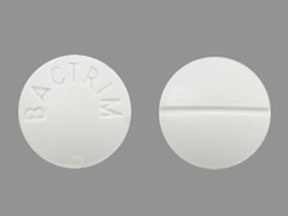Bactrim and Alcohol/Food Interactions
There is 1 alcohol/food/lifestyle interaction with Bactrim (sulfamethoxazole / trimethoprim).
Sulfamethoxazole Alcohol (Ethanol)
Moderate Drug Interaction
MONITOR: Two cases have been reported in which patients on sulfamethoxazole-trimethoprim therapy, after consuming beer, reported flushing, heart palpitations, dyspnea, headache, and nausea (disulfiram - alcohol type reactions). First-generation sulfonylureas have been reported to cause facial flushing when administered with alcohol by inhibiting acetaldehyde dehydrogenase and subsequently causing acetaldehyde accumulation. Since sulfamethoxazole is chemically related to first-generation sulfonylureas, a disulfiram-like reaction with products containing sulfamethoxazole is theoretically possible. However, pharmacokinetic/pharmacodynamic data are lacking and in addition, the two reported cases cannot be clearly attributed to the concomitant use of sulfamethoxazole-trimethoprim and alcohol.
MANAGEMENT: Patients should be alerted to the potential for this interaction and although the risk for this interaction is minimal, caution is recommended while taking sulfamethoxazole-trimethoprim concomitantly with alcohol.
References (2)
- Heelon MW, White M (1998) "Disulfiram-cotrimoxazole reaction." Pharmacotherapy, 18, p. 869-70
- Mergenhagen KA, Wattengel BA, Skelly MK, Clark CM, Russo TA (2020) "Fact versus fiction: a review of the evidence behind alcohol and antibiotic interactions." Antimicrob Agents Chemother, 64, e02167-19
Switch to consumer interaction data
Bactrim drug interactions
There are 463 drug interactions with Bactrim (sulfamethoxazole / trimethoprim).
Bactrim disease interactions
There are 12 disease interactions with Bactrim (sulfamethoxazole / trimethoprim) which include:
- colitis
- hematologic toxicity
- hypersensitivity reactions
- liver disease
- porphyria
- renal dysfunction
- folate deficiency
- crystalluria
- hemodialysis
- urinary obstruction
- dialysis
- renal dysfunction
More about Bactrim (sulfamethoxazole / trimethoprim)
- Bactrim consumer information
- Check interactions
- Compare alternatives
- Pricing & coupons
- Reviews (619)
- Drug images
- Side effects
- Dosage information
- Patient tips
- During pregnancy
- Generic availability
- Support group
- Drug class: sulfonamides
- En español
Related treatment guides
Drug Interaction Classification
| Highly clinically significant. Avoid combinations; the risk of the interaction outweighs the benefit. | |
| Moderately clinically significant. Usually avoid combinations; use it only under special circumstances. | |
| Minimally clinically significant. Minimize risk; assess risk and consider an alternative drug, take steps to circumvent the interaction risk and/or institute a monitoring plan. | |
| No interaction information available. |
See also:
Further information
Always consult your healthcare provider to ensure the information displayed on this page applies to your personal circumstances.


